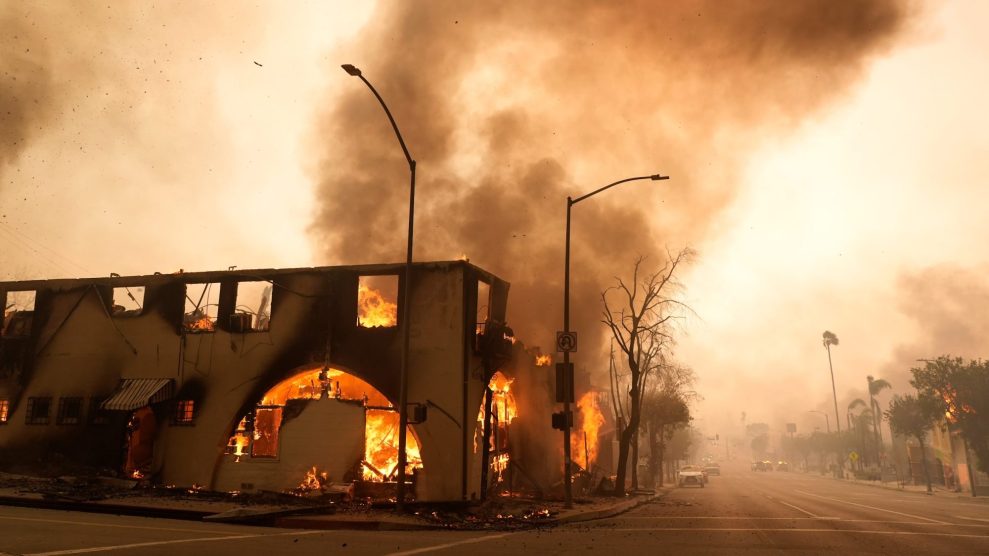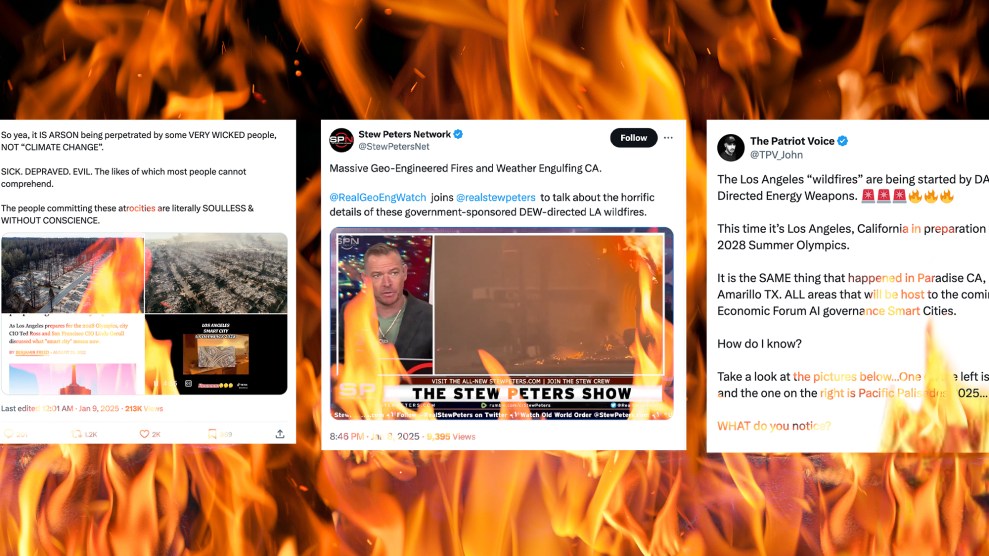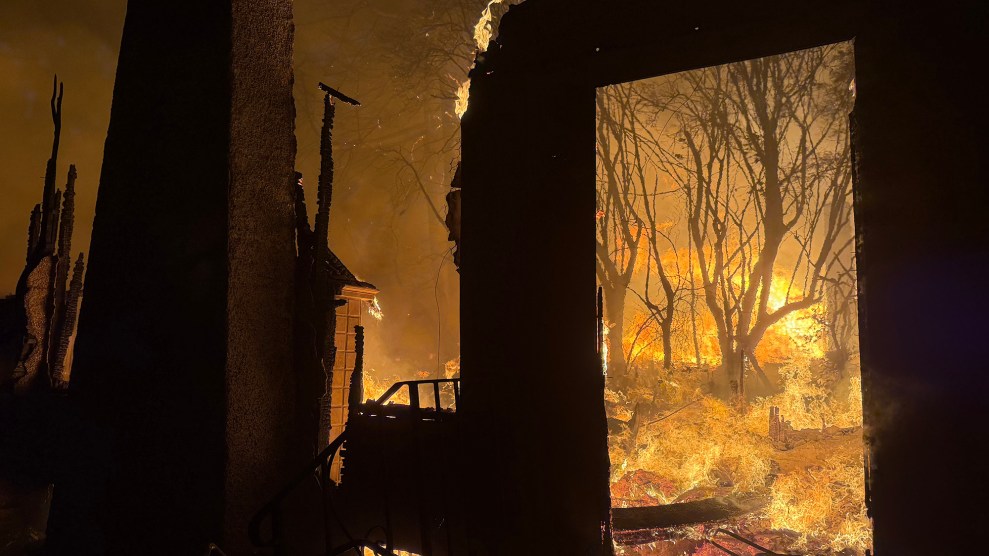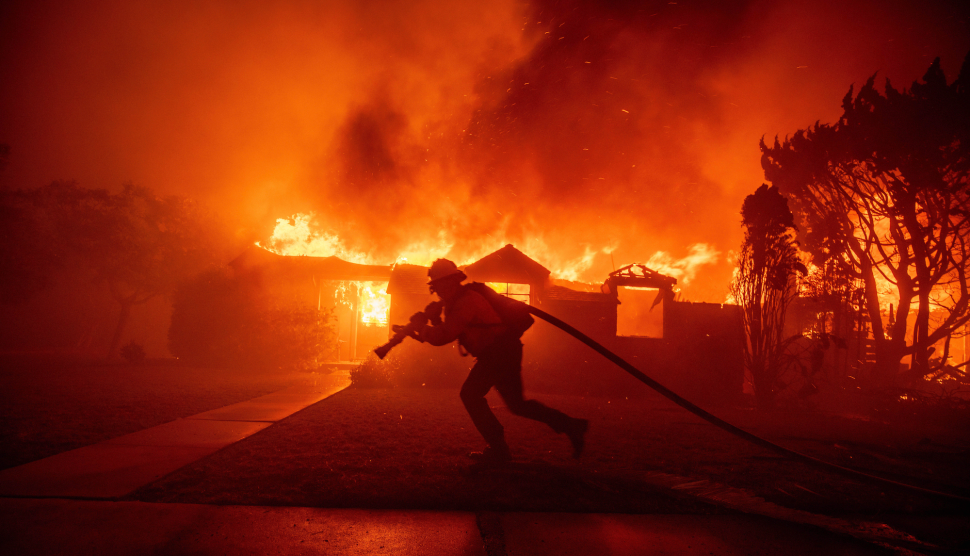Mother Jones: If a decision is made to withdraw or draw down troops, what is a realistic time frame for actually doing something like that?
Colonel William Darley: When we left Vietnam, we left mountains and mountains and mountains of stuff there. That included a lot of weapons that later ended up in places like Nicaragua and in Africa. We left huge quantities of brass and copper and just massive amounts of stuff. A person in my position always hates to compare Vietnam to this situation, but in terms of the logistics it would take to make an efficient withdrawal—it would probably be months if not a year or more to get it done. To pull out everything doesn’t make sense. At some point, it costs more to move the item than the item is actually worth. We have a huge investment out there. There are tens of billions of dollars invested in the infrastructure. With regards to pulling the units out, pulling the ammunition out, pulling all the logistics framework, I’ve got to think it would probably take at least a year or more. It would be methodical. There’s no way to rapidly move out a whole bunch of Abrams tanks and Bradleys. To make sure they are maintained is very difficult. A tank or a Bradley, even though it’s a big, heavy, blunt instrument of war, is really a very delicate thing. There are lots and lots of things that can go wrong unless they are very carefully handled.
MJ: In the event of a withdrawal, what level of threat will the troops face on the way out?
WD: There may be casualties, there may be attacks, but we’re talking very heavy forces here massing together and moving as a massed force. There is nothing there that can effectively oppose them. I’m sure there are contingency plans. Part of the business of military planners is for them to develop theoretical plans for all kinds of options. So I am sure that Secretary Gates has asked the question, as Senator Clinton has.
MJ: What’s your take on the situation on the ground now?
WD: My feeling is that we kind of turned the corner. Al Qaeda is clearly the force that’s singling out civilians and killing them en masse, but really they’re on the run right now. That doesn’t mean they can’t reorganize and can’t get refitted and come back with a vengeance, but they’re getting their butts kicked right now, people who are in the know tell me. It’s not necessarily being driven by the coalition. It’s being driven because the Shiite and Sunni are fed up with them. The Sunni sheikhs are just fed up with Al Qaeda, because Al Qaeda was singling out Iraqis. I think it’s much too early for exuberant elation, but I think there is lots of room for encouragement. I think the solution to the problem is going to rest on [Nouri] al-Maliki and what he is able to do, what he is willing to do, and whether he is able to persuade the Shiite to reconcile with the Sunni. Now if Congress decides to pull the plug, then that’s the end, but we’ll see.
MJ: What is the level of anxiety in the military about how the decision making plays out domestically?
WD: Huge. There’s a great deal of anxiety. There’s a huge emotional dynamic. Most of these guys have known people, lost friends in the war. Some of them have lost limbs, or been shot up in the war. There’s a huge emotional investment. We paid such an awful price. Nobody wants to give it up and throw it away.
MJ: They want to complete the mission.
WD: Yes, but the other part of this is, at the same time, nobody wants to keep throwing money down a rat hole or lives down a rat hole. The American soldier shares with the American public that frustration. If you’ve got a terrible policy and it’s going nowhere then you need to either change the policy or stop.
MJ: Is it a source of frustration that Beltway politics seems to be driving how this war is waged?
WD: Absolutely. Politics has been problematic from the very beginning. In the view of the military, most people in the military, politics is what stood in the way of doing the right thing to start with. The politics of the situation precluded many, many things that needed to be done.
MJ: Such as?
WD: Not sending enough people. That’s the first thing. Most people in the Army and the Marines would tell you they needed at least 400,000 people. And they send 130,000.
MJ: The whole General Shinseki episode?
WD: Yes, but it wasn’t just him. There were lots and lots of guys who just quit over that issue—generals. There are other things, too. Nobody in the Army thought it was a good idea to disband the Iraqi Army. The political guys all thought that this was a rehash of Germany and the Baathists were the new Nazis. “Well, let’s dump them, because that’s what we did in Germany.” There was just no cultural sophistication at all in terms of understanding the differences between Iraq and Nazi Germany. It was just a template that was overlaid by [Paul] Wolfowitz and those guys. You know over the surface of this. There was no understanding that the only thing that all Iraqis identified with was the military. When you stripped that backbone out, then there is no common culture. The people in the military and the CIA that understood this were just dismissed out of hand, because of politics. So that’s where we’re at.
MJ: You served under General David Petraeus at Fort Leavenworth. Tell me about him.
WD: General Petraeus is the most competitive person I have ever known, ever. I have known many four-star generals. He is the most competitive guy in every way. He is a deep thinker. He is also a quintessential diplomat. I am not going to say politician because that kind of carries a connotation, but he is a diplomat. He is a genuine soldier-scholar diplomat. I mean he runs five miles a day and he can do any military skills you want, he can do it better than you, and he will make a point of it. He knows everybody. Any person of note in the news that you would think of, across all political spectrums, at some point or other he had personal contact with him. He has a personal relationships with a large number of members of the media. He very patiently explains what he is doing. He very patiently listens to criticism. He’s not a flamer. Are you familiar with that term?
MJ: No.
WD: A flamer is a guy who settles every issue by yelling at you, or screaming at you, or demanding things and bullying you into doing things. That’s their idea of leadership. That’s not Petraeus at all. He is a very quiet, lead-by-example guy, very demanding though. You cannot do enough push-ups or pull-ups for General Patraeus. You can’t. If you did 50 push-ups last week and you did 100 this week, he’d ask you for 150 next week.
MJ: Right. What’s your take on what the regional aftermath would be if we were to pull out too quickly?
WD: It would be civil war between the Sunni and Shiite, and the Kurd and the Turkoman would be at each other. Right now you are watching a small bloodbath, but a month or two months ago it was not uncommon for fifty, a hundred people a day to be killed. I would think if we were to leave, with the quantity of weapons there, with the Iranian influence facing off with the Saudi influence and the Al Qaeda influence, I think you would be talking many hundred a day. If you let these guys duke it out, they will. And Iran is in a position to be pretty helpful to people that want to duke it out on behalf of their own religious ideology.


















